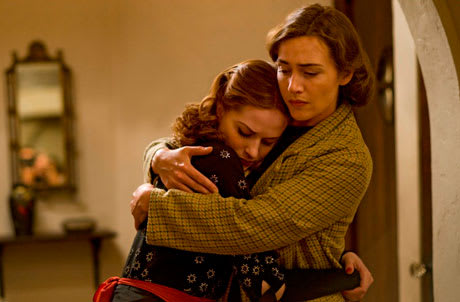In the "Making of" supplemental materials included with the Mildred Pierce Blu-Ray and DVD box set, writer/director Todd Haynes contextualizes the miniseries by noting the similarities between present day economic strife and that of the Depression era. He cuts beneath surface symptom accusations of corporate ideologies popular amongst modern day urban undergraduates and examines the values and social customs of the middle-class, smartly pinpointing the follies in dominant socialization that lead to historical repetition. Rather than vilify the martyred Mildred Pierce (Kate Winslet) for forging out into the world following her divorce and building a pie empire, leaving her materially obsessed daughter, Veda (Evan Rachel Wood/Morgan Turner), with her drunken playboy arm candy lover, Monty (Guy Pearce), he quietly notes the cause and effect nature of it all by assessing ideas of success and the American dream. In theory, Mildred's ability to move from unemployed to diner waitress to business owner during such a low point in history suggests a strength of feminist will, implying capitalistic values by championing those that work hard. But what's more of interest to Haynes, something that is intelligently underplayed by Kate Winslet, is why she's so obsessed with money and class, so much so that she turns down a job as a maid despite being unable to feed her children. Mildred herself is fine with the simple things. She bakes her pies, seems content living in Glendale, CA and enjoys chatting with her neighbour, Lucy (Melissa Leo). But her daughter, having learned the importance of image and prestige from her working father and housewife mother, pins her maternal love on material objects and class system domination. Similarly, Mildred only exists as an entity of relevance when she defines herself through fiscal superiority, ultimately being loved in exchange for her ability to contribute to the economic cycle. This is why her inevitable downfall and the trajectory of exacerbated greed – the more money she makes, the more she desperately wants more – becomes the antagonist and villain of this impressively rendered miniseries. Said greed doesn't come from within; it comes from the need for acceptance. And just as impressive as the astute social observations and their current relevance is the fact that Haynes, known for making analytically keen, but emotionally hollow, films (aside from Safe), manages to inject a bit of human emotion into this series, primarily in the first parts when Mildred is trying to look after and love her ungrateful daughter. Eventually, the metaphors and deliberate parallels dominate, leaving the overall experience of viewing colder than it should be, but his self-consciousness about valuing intellect over emotion is resulting in his growth as a filmmaker.
(Warner)Mildred Pierce: The Collector's Edition [Blu-Ray]
Todd Haynes

BY Robert BellPublished Jan 18, 2012